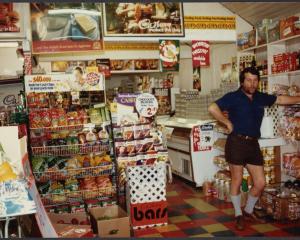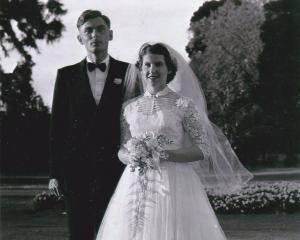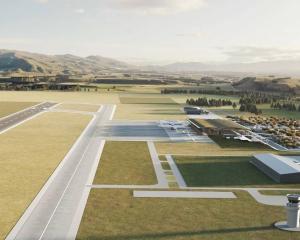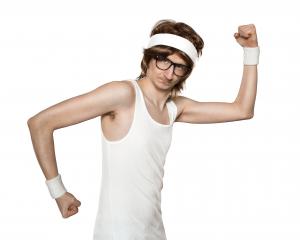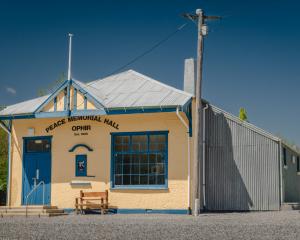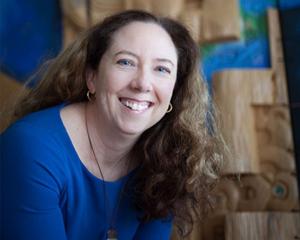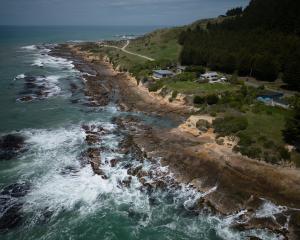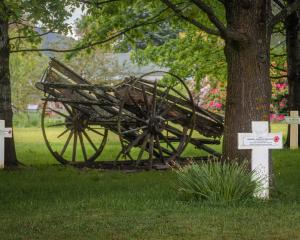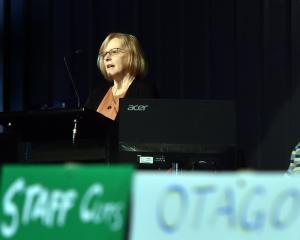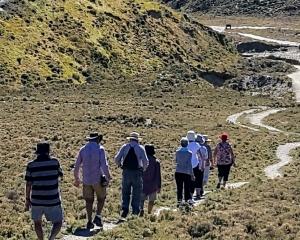They do it for love, not money, and readers of the Otago Daily Times sports pages over the past few decades should be thankful for that. They are the long-serving ''stringers'', or contributing writers. In the final of three profiles, sports editor Hayden Meikle talks to tennis identity Dennis Radford.
Dennis Radford
ODT position: Tennis writer.
Held since: Early 1970s.
Age: 64.
Occupation: Teacher/tutor.
Family: Married to Dale, three children.
Hayden Meikle: Where did you grow up?
Dennis Radford: I was born in Dunedin. But my Dad shifted all over the country. I went to Dunedin, Invercargill, Greymouth, Whangarei, Invercargill and then back to Dunedin for university, and I haven't left.
HM: What did your father do?
DR: He was in the post office. Just kept chasing the jobs. Worked his way through from delivery boy on the Banks Peninsula to a senior supervisor. Was there 40 years. I'm a bit of a homebody now because I didn't like all those shifts as a kid.
HM: You must have been to a lot of schools.
DR: That was the problem. I think I had nine schools. Just as you made friends, you lost them. I went to St Bernadette's in Dunedin, Marist in Greymouth, Kamo High School, all sorts.
HM: What was your dad's name?
DR: Des. Won the Otago Open in 1950. I like to go down to the honours board at Logan Park and point out I won the tournament at the age of 2. D. Radford, 1950.
HM: And your Mum?
DR: Elvra. She was mostly a full-time mother.
HM: You were obviously exposed to tennis as a kid.
DR: I could have a rally of about 40 or 50 when I was 4 or 5 with a little bat Dad made. I tagged around after him at the courts. I did everything. In Invercargill, I pitched for a midweek softball team, played senior tennis, and then rushed off to cricket. Played a bit of rugby. I could have been better academically, but I always thought a C was good enough. If I got a B, I worried I'd wasted some good time on the tennis court.
HM: Did you play club tennis when you came back to Dunedin for your studies?
DR: Yes, Mornington. And as a trainee teacher, I coached over 100 kids. Some of those kids are still playing. One of them, John Alexander, is on the Otago board.
HM: What were your highlights as a player?
DR: I remember my best match. I won the Southland Open after being down 6-3, 3-1 to Mark Belcher, who thought he was going to make the Davis Cup squad. He fell over with cramp. I remember sort of standing over him, like a boxer. But probably my biggest highlight was playing Onny Parun in Timaru. He was the French Open doubles title-holder. A big crowd turned up, of course. I held him to 9-9 in the first set before losing 11-9, 6-2. I couldn't break his serve, but I was able to hang in there. Another good win was against Peter McNamara, who made the top 10 in the world. He was 16. I look back and say, I beat McNamara, and he beat three world No1s - Lendl, Conners and Ashe - so I was the world champion in two moves.
HM: Did you have a national ranking?
DR: We didn't have computer rankings and all that sort of stuff, so it was difficult. I beat players rarely in the top 10, but I often beat people in the teens.
HM: How long did you represent Otago?
DR: I played 200 ties, and I don't think anyone else got to 100. You couldn't do it now because they don't play enough. I played up to 15 ties a year. We had two quadrangulars away, and two at home, and we played Canterbury every year. I actually played over 30 years, from the age of 18 or 19 to the age of 48. My last tie for Otago was a doubles match in Christchurch. I was manager, and someone got injured. Dad played for Otago at the top level until he was 50. One year, I played Alistair Hunt at No1, and Dad played Colin Hunt, Alistair's father, at No6. Dad played incredibly well for an old guy. He was very cunning. I was the same until my back gave up.
HM:What sort of tennis player were you?
DR: They called it an all-court game. I was mainly serve-volley on grass. I was quick round the net. Never that fit, just quick and quite bloody-minded. I had a few tricks. I'd get into a dire situation and somehow produce a shot that got me going again.
HM: What was your favourite venue?
DR: Wilding Park, in Christchurch. It just about made me cry to see it wrecked by the earthquake. Also Thomas Neale Memorial Park, in Kamo. I went back there and played in front of a huge crowd.
HM: Any regrets?
DR: I probably shouldn't have hit so many top-spin second serves. I've got numb toes, numbness down my side. I was told to stop playing because of my back, or I'd be in a wheelchair. I miss it badly. I would have loved playing veterans' tennis.
HM: How and when did you get the job covering tennis for the ODT?
DR: It was the early 1970s, and they had the old Star Sports on yellow paper. I was called Double Fault. There were two sub-associations in the city but only one, the Dunedin Lawn Tennis Union, was getting newspaper space. We were the serious players, the whole Otago team. The parent body wasn't getting the coverage. I got a bit grumpy, so I went in to see the paper. I started writing a page a week. Mainly anecdotes, nothing too serious. Then I ended up approaching Brent Edwards at the ODT to offer my services.
HM: How do you like to cover a tennis event?
DR: We don't have any big events any more, really. We used to have the national league. Games would finish at 8.30pm or 9pm. I got better and better at writing part of the story, then chucking the last bit on top. I'd fax it through. I've only got used to the computer in the last 5-6 years.
HM: What was the heyday of Otago tennis during your era?
DR: It's probably got gradually worse since I started. When I was a kid, we had big-name professionals coming here. People like Jack Kramer, Dinny Pails, Frank Sedgman, Pancho Gonzales, Ken Rosewall, Lew Hoad, Rod Laver. They all visited us. I've kept all their scoresheets, because Dad umpired them all. Then we had the Borg-Lewis game in Dunedin. National league tennis. But it's just gradually declined. We used to have 36 clubs in town, and now we've got seven or eight.
HM: Is New Zealand tennis as a whole in the doldrums?
DR: It comes down to funding. Tennis gets a tiny amount nationally. Rowing get millions for what is a nothing sport in the world. New Zealand is good at them because no-one else cares. Everyone plays tennis. It's No3 in the world to football and basketball.
HM: But Scotland has Murray, Switzerland has Federer. These aren't massive countries.
DR: No, you're right. But I think there's an administration issue. We've got a surf life-saving guy running New Zealand tennis. Why are Chris Lewis, Brett Steven, Onny Parun, Kelly Evernden and the Simpsons all overseas or not coaching? Why did James Greenhalgh and Steven Downs give up after Wimbledon junior doubles? No support, no pathway. It's a hard life for young tennis players here. We're at the bottom of the world. It's something like $US120,000 ($NZ145,000) to go on the basic pro circuit for a year, if you stay cheaply and don't have a coach. You need to win or be runner-up every week to get your money back. And there are thousands and thousands of people doing it. If you're in the top 1000 in the world, you're a great player now.
HM: So, isn't that an argument against New Zealand throwing money at tennis players? What are the rewards?
DR: It's not going to deliver gold medals, and that's the way they think. It's all about the Olympics and the Commonwealth Games. We're good at rugby league and netball, things like that. But nobody plays them. I genuinely think Sport New Zealand has no idea how big tennis is now.
HM: And Otago tennis? Where is it at?
DR: For a person who has lived through the previous era, it's really sad. There are a lot of good juniors running around. But you see lots of people who just want to play for one night a week. They don't want to devote their Saturdays and Sundays to the sport. I've got a list of 70 names in a book of people between 18 and 21 who stopped playing tennis totally and haven't resumed. That's in the last 13 years. I trained seven different women to win the Otago Open, and nearly all of them gave up. We used to have 9000 affiliated players, and now it's only a few hundred. I think my club, St Clair, has only got 15 full fee-paying members. The Edgar Centre has been a bit of a problem. Without tennis, it wouldn't exist. We built the Dunedin Stadium from the ground up, and we had 20 courts at Memorial Park. We gave both of those up if the city council would help us get into the Edgar. Now we can hardly buy a court. We're getting shuffled out. It's an economic reality that something like futsal, with so many people on the court, pays its way better than tennis.
HM: It all sounds a bit grim.
DR: It is sad. We don't have a premier women's competition. The men are down to two-person teams on a Tuesday night. The irony is we have 96 two-person secondary school teams. They come along and play two timed matches and go home. It's happening everywhere. No interclub in Timaru. No interclub in Invercargill. Oamaru's still got it because of the little communities that are still into it.
HM: Have you also coached over the years?
DR: Not formally. I've got absolutely no qualifications and I'm proud of it. If you want to talk about technique, go and see a coach. If you want to know how to win a tennis match, talk to me about body language and psychology. That was my strength. Confidence. Mind games. Projecting an image that you were certain of winning.
HM: What about administrative roles?
DR: I've been on the Otago management committee, board, whatever you call it, since I was 19. The only years I missed was when our son was born and had colic. A couple of years ago, there was a failed experiment when New Zealand created six zones and Tennis Southern paid big salaries to people who didn't know about tennis. I took a break then. I've been involved with Tennis Southern, or the Southern Districts, from 1974 to this year.
HM: Umpiring?
DR: It's all self-umpiring these days. But I referee about 20 days a year. I've done world ITF senior events.
HM: You've worked as a teacher mainly?
DR: Yes. About seven different primary schools. I was made redundant after 37 years, so I went relieving. I found that quite rewarding. Did 39 different schools. Now I'm just doing Tahuna Intermediate. I also do some tutoring in the evenings.
The greatest tennis players Dennis Radford has seen in Otago
1. Pancho Gonzales - ''The most colourful. He ran a circus of professionals and would keep half the money for himself.''
2. Lew Hoad, Ken Rosewall, Rod Laver - ''They all played here.''
3. Bjorn Borg and Chris Lewis - ''Unforgettable game in Dunedin. I was on the service line. The crowd and the noise was amazing.''
4. Margaret Borland - ''I remember when she made the semis of the New Zealand champs.''
5. Ruth Seeman, Shelley Stephens, Di Hollands - ''All played against men here and then made Fed Cup.''


